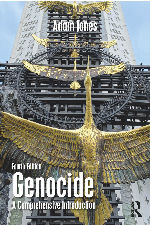




Again in Spanish, this profile of my research on "gendercide" in a leading Argentine publication is based on an interview conducted during my November 2007 visit to Buenos Aires, to participate in the Second International Meeting on Genocidal Social Practices. (Link to print version in PDF format.)

For those able to read Spanish, María Ángeles Alaminos of the Universidad Complutense de Madrid has published a generous review of Genocide: A Comprehensive Introduction in UNISCI Discussion Papers, Nº 15 (October 2007). Click here for the complete text of the review in PDF format.

By Cara Brady
The Morning Star (Vernon, BC)
15 March 2006
The word is recent but genocide could be as old as humanity. Dr. Adam Jones talked about the origins of genocide, its impact on the world, the rapidly growing field of studies and possible solutions in his Capsule College lecture Thursday.
"There are two broad schools of thinking about genocide. One is that it has always been with us as we define ourselves largely by what we are not, us vs. them, the in-group and the out-group, so that the roots of genocide are lost in pre-history. The other thought is that genocide is a modern phenomenon, that is from the 16th century onwards as technological advances allowed more movement of people and the technology of death and modern nationalism made the state inextricably tied to a particular ethnic group," he said.
"I have to put myself rather squarely on the side of people who argue for continuity. There is a genocidal thread through history. It can be difficult to separate genocide from the ways things were normally done, wars and empire building."
Jones, the son of David and Jo Jones, grew up in Vernon. He is associate research fellow in the Genocide Studies Program at Yale University. He has published several books on genocide, most recently, Genocide: A Comprehensive Introduction.
He talked about historical events that are considered genocide by many scholars, including the Roman persecution of Christians, the Christian Crusades against Muslims, the expansion of the Mongol Empire, the European witch hunts, colonial expansion around the world and the deaths of Armenians and Jews in the 20th century.
"The Cambodian genocide of 1975-78 and the Rwandan genocide April-July 1994 where more than one million people died in 100 days, are still fresh in trauma and memory. We are beginning to understand how these events ricochet down the generations. This encourages you to look at aspects of the past in a different way and at the future in a different way," he said.
The word genocide was first used in 1944 by Raphael Lemkin (1900-1959), a Polish jurist trying to answer questions about the deaths of 1.5 million Armenian Christians in the Ottoman Empire in the early 20th century and the Jewish Holocaust in Germany before and during the Second World War. Lemkin lobbied the United Nations to recognize what had happened and take steps for prevention and punishment. Genocide is generally understood to mean the targeting of people not for what they have done but for who they are, often including killing large numbers of a population.
The United Nations Genocide Convention of 1948 is much broader and is still being interpreted legally. It includes national, ethnic, racial and religious groups and actions that cause destruction of life, destroy the conditions necessary for life including homeland and livelihood, cause bodily or mental harm, preventing birth and the forced transfer of children of one group to another group.
"It's a complex, problematic piece of legislation. It doesn't have to be a state using an army to commit genocide; the convention says nothing about tactics. There is a move away from a vision of genocide that was determined by the structure of the Jewish Holocaust. Motive doesn't matter in genocide. What matters is intent. If an institution resulting in mass death is imposed and kept in place and the consequence is destruction of a group, you meet the criteria for intention," said Jones.
Jones, who is co-founder and executive director of Gendercide Watch did not have time to talk about gendercide, the targeting of groups based on sex. He referred people to www.gendercide.org, a web-based educational initiative that confronts gender-selective atrocities worldwide.
He sees the task for the future as understanding the link between genocide and war and attempting to develop an early warning system for genocide intervention.
Some signs that genocide could occur include a prior history of genocide, exclusionary systems of government, legislation against groups, economic crisis, local customs and traditions, the rise of hate propaganda and smaller scale killings.
"If these signs can be recognized, they can be confronted and hopefully banished," said Jones.
He sees a strong secular education with peace and conflict studies introduced early in schools as a way to prevent genocide in the future. He answered the question, "What can any one person do?" by saying, "Question authority and constantly be aware of the messages that are coming at you from your leaders, your media and your peers. Keep your personal autonomy." Jones said current situations which could become genocidal are Iraq, Israel/Palestine, Chechnya and Haiti/Dominican Republic.
For more information see www.genocidetext.net and Jones' personal Web site, adamjones.freeservers.com.
